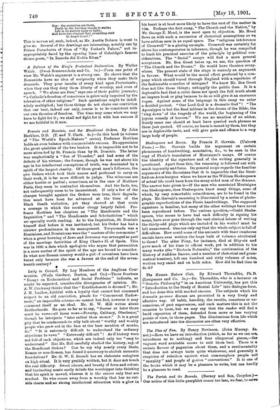Francis and Dominic, and the Mendicant Orders. By John Herkless,
D.D. (T. and T. Clark. 3s.)—In this book (a volume of "The World's Epoch-Makers" series) Professor Herk less bolds an even balance with commendable success. He appreciates the great qualities of the two leaders. It is impossible not to be more attracted by St. Francis than by St. Dominic. The latter was emphatically a "Son of Thunder," and had some of the defects of his virtues ; the former, though he was not above his age in his intellectual conceptions of truth, was dominated by a spirit of the largest charity. Of these great men's followers, the two Orders which took their names and professed to carry on their work, it is far more difficult to judge. The witnesses are either hostile or partial ; sometimes, as in the case of Matthew Paris, they seem to contradict themselves. And the facts, too, not unfrequently seem to be inconsistent. If only a few of the charges brought against the Orders were true, their degrada- tion must have been far advanced at the time of the Black Death visitation, yet they showed at that crisis a courage in which the secular clergy largely failed. Pro- fessor limitless has chapters on "The Mendicants and the Inquisition" and "The Mendicants and Scholasticism" which are specially worth reading. As to the Inquisition, St. Dominic himself died before it was instituted, but his Order has had a sinister predominance in its management. Torquemada was a Dominican, and Dominicans were the" masters of the ceremonies" when a great burning of Jews and Jewesses was arranged as part of the marriage festivities of King Charles U. of Spain. This was in 1680. a date which apologists who argue that persecution is a mere matter of the spirit of the age are bound to consider. In what non-Roman country would a girl of seventeen have been burnt only because she was a Jewess at the end of the seven- teenth century?






































 Previous page
Previous page